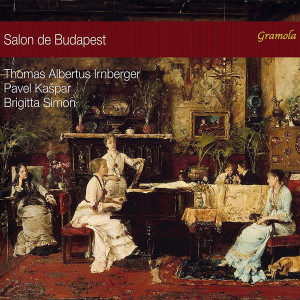
Salon de Budapest
Thomas Albertus Irnberger (violin)
Pavel Kašpar (piano)
Brigitta Simon (soprano)
rec. 2020, Mozart-Saal, Salzburg
No texts
GRAMOLA SACD 99249 [77]
The Hungarian salon milieu is recreated in this disc by violinist Thomas Albertus Irnberger and Slovak-born pianist Pavel Kašpar, assisted by soprano Brigitta Simon in nuggets from the goulash of Hungarian operetta. It all adds up to a surprisingly tasty dish.
Some of the names are very familiar, others much less so. However, to begin the programme with Franz (born Ferenc) Lehár is to open a vista on the riches of the programming and simultaneously to get to the heart of the matter. His Ungarische Fantasie is not that well-known and doffs the hat to Sarasate as well as to the Gipsy muse, which Sarasate also exploited, of course. Irnberger laces his playing with a full complement of slides smoothly exploring the variations, whether snappy and forceful or full of insinuating terpsichorean vitality. He plays obbligato to Simon, who has a rich and resonant soprano but indistinct diction, in the Lied and Csardas from the operetta Gipsy Love. She also employs rather too much vibrato in the aria from Kacsóh’s János Vitéz.
Two violinists follow, making a contrasting pair: Auer and Joachim, both Hungarians. Auer’s Deuxieme Rêverie is infused with elegant nostalgia, a salon morceau though with some more agitated writing in its B section. Joachim’s Romanze is an early work dating from around 1850 when the violinist (and composer) was not yet 20 and it, too, is a healthy, decorous piece without any really distinctive features. Talking of Joachim, Irnberger plays two of Brahms’ contrasting Hungarian Dances, numbers 1 and 16 – one popular, the other less often encountered in mixed recitals. Carl Bohm’s La Zingana is a melange typical of Austro-Hungarian composers, a coffee made up of Gipsy and Mazurka influences. Miska Hauser’s Csárdás employs the Lassú and Friss principal cleverly, and though it’s quite straight in the former and freer in the latter – and a touch cosmopolitan – it retains interest by virtue of the stylish playing of Irnberger and Kašpar.
Sylvia’s Entrance Song from Kálmán’s The Csárdás Princess is heard in Michael Bastian Weiss’s arrangement and provides three minutes of passion and fun for the listener. Hubay’s Hejre Kati is precise, spick and span – possibly a little undercooked – whereas Tchaikovsky’s Meditation is notable for some interesting finger position changes. Most people will probably be unaware that Rachmaninov wrote a Danse Hongroise when he was 20, in 1893, but here it is, appropriately fast and fiery. La Gitana is heard in a performance that elasticates the melody line and the disc ends with three Hungarian Dances by Kodály; slow and sultry, resinous and colourful, and fast and dramatic. These unadulterated folkloric pieces make for a fine closer.
Irnberger and his partners have been well recorded in the Mozart-Saal, Salzburg. For the operetta texts you’ll have to search further afield as they’re not printed in the booklet. Christian Heindl has written some fine booklet notes – apropos and funny – and I’m sure that this well-programmed disc will give subtle pleasure to the inquisitive gastronome.
Jonathan Woolf
Help us financially by purchasing through



Contents
Franz Lehár (1870-1948)
Ungarische Fantasie, Op.45 (1897)
Lied and Csardas from the operetta Gipsy Love (1910) arr. Michael Bastian Weiss
Leopold Auer (1845-1930)
”Deuxieme Rêverie” for violin and piano (1901)
Joseph Joachim (1831-1907)
Romanze for violin and piano Op.2 No.1 (c.1850)
Pongrác Kacsóh (1873-1923)
”O csak ne volnék” from the operetta János Vitéz (1904) arr. Michael Bastian Weiss
Johannes Brahms (1833-1897)
Hungarian Dance No.1 in G minor for violin and piano, WoO 1/1 (1879) arr. Joseph Joachim
Hungarian Dance No.16 in F minor, for violin and piano WoO 1/16 (1879) arr. Joseph Joachim
Jenő Huszka (1875-1960)
Leila belépője from the operetta Gül Baba (1905) arr. Michael Bastian Weiss
Carl Bohm (1844-1920)
“La Zingana” for violin and piano (1890s)
Miska Hauser (1822-1887)
Csárdás, Hungarian Song without Words, Op. 38 No. 2 (1857)
Emmerich Kálmán (1882-1953)
Lied der Sylva: Entrance Song from the operetta The Csárdás Princess (1915) arr. Michael Bastian Weiss
Jenő Hubay (1858-1937)
Hejre Kati, Op. 32 No. 4 (1890)
Pyotr Ilich Tchaikovsky (1840-1893)
Souvenir d’un lieu cher: Meditation, Op.42 No.1 (1878)
Sergei Rachmaninov (1873-1943)
Morceaux de Salon: Danse Hongroise, Op.6 No.2 (1893)
Fritz Kreisler (1875-1962)
La Gitana
Zoltán Kodály (1882-1967)
Three Hungarian Dances, for violin and piano


















